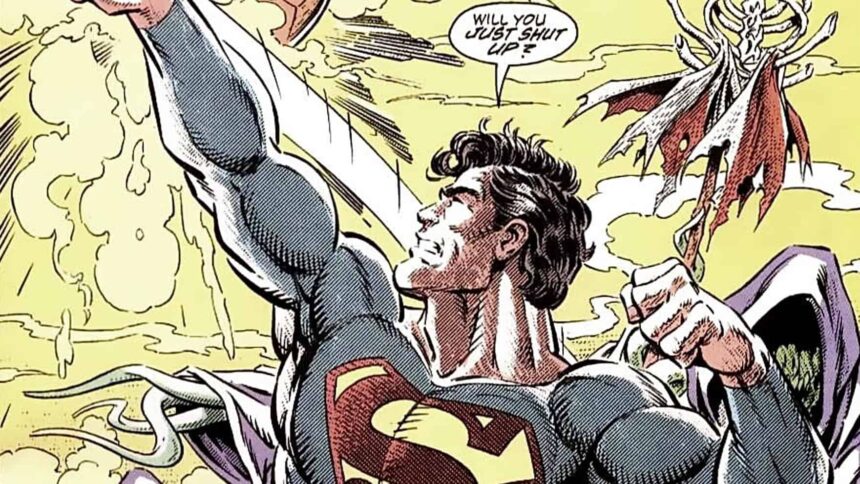By Drew Dietsch
| Published
I’ve already raged about one facet of the manufactured anti-Superman discourse. Since the world continues to make me angrier and angrier, I figured it would be good to channel that rage into tearing down another equally ridiculous mindset opponents of James Gunn’s movie have weaponized: the idea that Superman as a character/concept has become irrelevant.
To which I say, you are once again showing your ass. You don’t know anything about heroes, storytelling, popular culture, or human psychology.
The Gods of Story

There are an infinite number of stories and story types, but my personal belief with storytelling is that there are two Gods of Story. These are the primal narrative needs that have driven human perception and social evolution for the entirety of our sentience: The Hero Story and The Horror Story.
These are the two story templates that we as humans need fulfilled. It’s why we have religious mythology to this day. The power of these two kinds of stories will always be relevant and necessary to feed the collective consciousness.
Just on that elemental level alone, Superman is a permanently relevant idea and worth using to explore our relationship with The Hero Story. These kinds of characters and stories have persisted throughout history in any number of cultures. For as long as there have been people crafting stories in caves, we have required heroic fantasy storytelling with iconic role models that embody our hopes and aspirations.
Honestly, that should be the end of the conversation. But, just so I can say I covered a broad enough amount of ground, let’s drill into the specificity of Superman and why he remains relevant almost a century after his creation.
Superman Is American Mythology

While I won’t go into an entire biography of Superman creators Jerry Siegel and Joe Shuster, I will highlight that they were both the children of Jewish immigrants and their heritage is inextricable from the character of Kal-El, a name that draws from the Hebrew language. Just listen to Batman producer Michael Uslan’s legendary recounting about relating the story of Moses to the story of Superman.
Kal-El is a foreigner, a literal alien, who illegally enters the country. He is sheltered and raised by two of America’s heartland farmers, the Kents, and grows up believing in the best about people from all cultures and creeds. He makes his purpose in life to protect those who can’t protect themselves.
This is the story we Americans tell about our own national mythology. While I’m certainly not saying it’s reflective of the truth about America, it is the story we want and need to believe in: America as a force of good that came from another place, realized its incredible power, and used that power to help the world instead of hurt it.
No matter what cynics or fascists draped in the flag might say, this idea of absolute power being wielded with absolute kindness should be the foundational narrative us Americans strive towards. It’s the Hero Story of our country’s promise. If that isn’t eternally relevant, then we aren’t telling a Hero Story about America anymore. We’re feeding the Horror Story.
And if you’re still convinced that Superman is irrelevant after that, let’s spend some time shooting down a few expected, boring, and downright bug-brained arguments on that front.
“Superman is irrelevant!”

“Superman is an outdated take on the superhero. Just because he’s the original superhero, that doesn’t make him special. In fact, that makes him boring. His powers are stupid. They give out his powers to characters all the time because they’re so basic. He’s so basic.”
I refer you to the concept of the archetype and why it’s so valuable and versatile over the course of human history’s relationship with storytelling. Superman’s status as the original superhero doesn’t make him outdated as a character. In fact, it’s fascinating to see just how many different iterations of Superman have existed across incalculable kinds of media. His status in popular culture has never disappeared, and his influence on the foundational aspects of the superhero template only create more reasons to continually examine him through his own stories.
“Superman doesn’t work in today’s harsher world. People won’t believe in a character who comes from a simpler time.”
Superman hit shelves just a year before World War II and found his popularity in the midst of the most devastating conflict in our planet’s known history. If that’s the world Superman was born into and he succeeded then as a symbol of hope and goodness, then it’s when the world is at its harshest that people need a simple and relatable hero to look up to.
“…Superhero fatigue.”
If you are tired of superhero stories, fine! Stop putting superhero stories in front of your eyes. As I talked about, the Hero Story is always going to be relevant to the collective consciousness. Even if superhero cinema fluctuates in general popularity, superhero stories are here to stay and have been since the dawn of stories.
Superman might not continue to function in cinema depending on the stories told with his character and world, but there is no way people will stop wanting Superman stories.
Siegel and Shuster took Friedrich Nietzsche’s nihilistic Übermensch and reformed it into the ultimate symbol of empathy and righteousness. Thanks to that, a hero who fights for truth, justice, and what should be the American way will stay relevant as long as we want to believe.


















